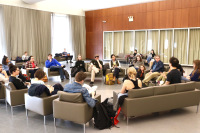A group of graduate students have organized an unofficial group called “Fordham Speaks Up” to discuss issues they see as pressing under President Donald Trump’s administration. The group brings together undergraduate and graduate students and faculty in the campus’s public spaces, such as McGinley Second or Edward’s Parade each Wednesday to analyze issues and discuss action individuals can take in light of such issues.
The group does not place sole blame on the administration for the lack of political dialogue. The group seeks “to encourage free speech dialogue about political issues on campus, which whether or not the administration cares, doesn’t seem like something that’s happening a lot in public spaces,” according to Vita Emery, GSAS ’19.
The group has no desire to be formally recognized by the administration.
“We don’t want to be an official group, in part because I do think the general feeling at Fordham is there aren’t a lot of places where students can convene and talk about things, and we think that that should be something that a university encourages, so like open spaces and meeting places to talk about ideas and things people care about,” said organizer Emery.
The graduate students, many of whom are in the philosophy department, conceived the idea of a network of support and dialogue following the election of President Donald Trump. In the eyes of those students, the need for open dialogue on Fordham’s campus grew when a protest of the President’s election was limited by the administration.
The organizers of Fordham Speaks Up circulated a flyer in the weeks after the election regarding their plans. They cited the limiting of this protest. “The first week after the election, students wishing peacefully to protest Donald Trump were instructed that they could not chant or hold up signs directed particularly against him or the hateful actions he has inspired. The political environment of our campus is repressive, to say the least, and will continue to become more so if nothing is done,” read the flyer.
Steven Payne, GSAS ’18, a theology graduate student involved in the organization of Fordham Speaks Up, cited the difficulty of forming protests through Fordham’s channels as a reason for the formation of the group.
“It’s always the excuse of logistics, but after a while you have to start doubting that excuse. And so we started doubting that excuse,” said Payne.
Because the group did not want to go through the administration’s channels to form a protest, as they feel it limits free speech, they formed a framework in which they gather informally to talk about issues and discuss opportunities for individual action.
The discussions, which occur from 2 p.m. to 3 p.m. each Wednesday, are broken into three equal sections of talk, deliberation and action. Attendees place themselves on an email list to receive updated information on actionable items, such as protests and petitions. The organizers frequently reference “Justice Duckling” for actionable items, a blog that posts actions and talks in New York City. Organizer Kate Breslee, GSAS ’20, and Emery stressed the importance of the actionable items to their cause. “It’s super easy for us as academics to pretentiously tell you all the things that are wrong, but that’s not going to help us. We need to do something about it other than intellectualize,” said Breslee.
Breslee added that she hoped the group would be a force for breaking boundaries between students and faculty when it comes to politics.
“It becomes I think irresponsible for certain things to be going on politically speaking and through my silence I basically imply that it is not an issue,” said Breslee. Though she maintained that teachers should remain open-minded in the classroom and present a variety of views, she felt that the group provides a forum for students to hear the political views of their professors.
The meetings are also a response to the rise of “alternative facts” under the Trump administration. “Something that is happening, either intentionally or unintentionally, by means of the Trump administration, is that people are coming to believe that facts are not knowable,” said Breslee. “I see the meetings as being an opportunity to remember that facts are knowable and to access some of those facts,” she said.
Fordham Speaks Up provides access to these knowable facts through its speakers. Speakers are not compensated and volunteer to present information in an area with which they have personal or professional experience. The group has hosted graduate students, professors and there are plans for an undergraduate presentation. Previous topics have ranged from “Standing Rock and Pipeline Protests in Trump’s America” to “From
Exclusion Laws to Concentration Camps: The Prehistory of Japanese American Incarceration during World War II.” The talks have met every Wednesday since Dec. 7, and have plans to continue until May 3.





